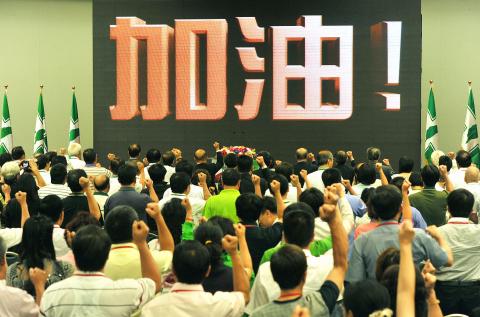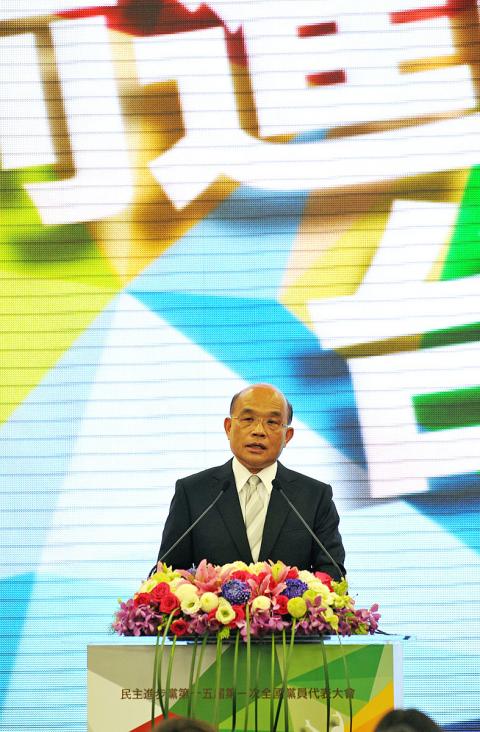Former premiers Frank Hsieh (謝長廷) and Yu Shyi-kun, along with the former New Tide faction, the most powerful grouping in the Democratic Progressive Party (DPP), came away victorious last night in elections that will shape the party for the next two years.
The two political heavyweights were elected to the 10-person Central Standing Committee (CSC), the party’s top decisionmaking and administrative body. Three members of the New Tide faction — Tuan Yi-kang (段宜康), Yen Hsiao-ching (顏曉菁) and Rosalia Wu (吳思瑤) — were also voted onto CSC.
The two former premiers’ “factions” also did well, with Kuan Bi-ling (管碧玲) of the Hsieh faction and Chen Ting-fei (陳亭妃) of the Yu faction also elected to the committee.

Photo: Chien Jung-fong, Taipei Times
Biennial elections for new members of the CSC, the Central Executive Committee (CEC) and the Central Review Committee, which oversees the party’s internal affairs, were held at the party’s annual national congress yesterday. The event marked a changing of the guard in the DPP after Su Tseng-chang (蘇貞昌) became party chairman in May.
Thirty Central Executive Committee members were selected from 560 party representatives to make the final nominee list, before the newly elected CEC members cast their votes to elect the CSC members.
The CSC is comprised of 17 members: the 10 elected members — which also included Tsai Hsien-hao (蔡憲浩), Ho Chih-wei (何志偉) and Lee Ching-fu (李清福) — along with seven members designated by the chairperson, three DPP legislative caucus executives and three mayors.

Photo: Chien Jung-fong, Taipei Times
Former DPP legislator Chai Trong-rong (蔡同榮) failed to win a draw and so lost the opportunity to retain his CSC seat. He had been tied with Wu and Yen, who had two votes each.
The results of the Central Executive Committee election yielded a balanced power-sharing structure between the now disbanded factions, with New Tide winning seven seats, closely followed by Yu’s faction, with six seats, Hsieh’s faction with five and the Su Tseng-chang faction with four. The Green Friendship Alliance and Greater Kaohsiung Mayor Chen Chu’s (陳菊) faction tied with two seats apiece.
The biggest surprise in the Central Executive Committee election was the loss of Deputy Kaohsiung Mayor Liu Shih-fang (劉世芳), who lost by one vote.
The party posts are the only occasion within the DPP where factions can compete for power, which is why they are vociferously contested and produce rumors of vote-buying and other allegations of cheating.
Most DPP heavyweights, including Hsieh and Yu, played down the rumors, with Hsieh saying that such allegations were made in nearly every DPP election.
Eleven Central Review Committee members were also elected at the annual congress.

CHAOS: Iranians took to the streets playing celebratory music after reports of Khamenei’s death on Saturday, while mourners also gathered in Tehran yesterday Iranian Supreme Leader Ayatollah Ali Khamenei was killed in a major attack on Iran launched by Israel and the US, throwing the future of the Islamic republic into doubt and raising the risk of regional instability. Iranian state television and the state-run IRNA news agency announced the 86-year-old’s death early yesterday. US President Donald Trump said it gave Iranians their “greatest chance” to “take back” their country. The announcements came after a joint US and Israeli aerial bombardment that targeted Iranian military and governmental sites. Trump said the “heavy and pinpoint bombing” would continue through the week or as long

TRUST: The KMT said it respected the US’ timing and considerations, and hoped it would continue to honor its commitments to helping Taiwan bolster its defenses and deterrence US President Donald Trump is delaying a multibillion-dollar arms sale to Taiwan to ensure his visit to Beijing is successful, a New York Times report said. The weapons sales package has stalled in the US Department of State, the report said, citing US officials it did not identify. The White House has told agencies not to push forward ahead of Trump’s meeting with Chinese President Xi Jinping (習近平), it said. The two last month held a phone call to discuss trade and geopolitical flashpoints ahead of the summit. Xi raised the Taiwan issue and urged the US to handle arms sales to

BIG SPENDERS: Foreign investors bought the most Taiwan equities since 2005, signaling confidence that an AI boom would continue to benefit chipmakers Taiwan Semiconductor Manufacturing Co’s (TSMC, 台積電) market capitalization swelled to US$2 trillion for the first time following a 4.25 percent rally in its American depositary receipts (ADR) overnight, putting the world’s biggest contract chipmaker sixth on the list of the world’s biggest companies by market capitalization, just behind Amazon.com Inc. The site CompaniesMarketcap.com ranked TSMC ahead of Saudi Aramco and Meta Platforms Inc. The Taiwanese company’s ADRs on Tuesday surged to US$385.75 on the New York Stock Exchange, as strong demand for artificial intelligence (AI) applications led to chip supply constraints and boost revenue growth to record-breaking levels. Each TSMC ADR represents

State-run CPC Corp, Taiwan (CPC, 台灣中油) yesterday said that it had confirmed on Saturday night with its liquefied natural gas (LNG) and crude oil suppliers that shipments are proceeding as scheduled and that domestic supplies remain unaffected. The CPC yesterday announced the gasoline and diesel prices will rise by NT$0.2 and NT$0.4 per liter, respectively, starting Monday, citing Middle East tensions and blizzards in the eastern United States. CPC also iterated it has been reducing the proportion of crude oil imports from the Middle East and diversifying its supply sources in the past few years in response to geopolitical risks, expanding